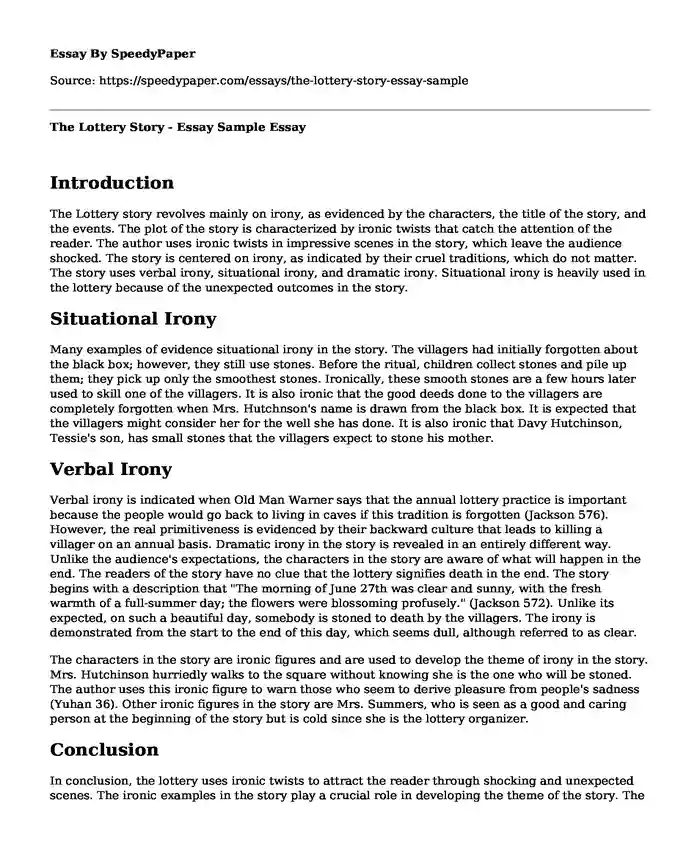
| Type of paper: | Essay |
| Categories: | Literature |
| Pages: | 2 |
| Wordcount: | 541 words |
Introduction
The Lottery story revolves mainly on irony, as evidenced by the characters, the title of the story, and the events. The plot of the story is characterized by ironic twists that catch the attention of the reader. The author uses ironic twists in impressive scenes in the story, which leave the audience shocked. The story is centered on irony, as indicated by their cruel traditions, which do not matter. The story uses verbal irony, situational irony, and dramatic irony. Situational irony is heavily used in the lottery because of the unexpected outcomes in the story.
Situational Irony
Many examples of evidence situational irony in the story. The villagers had initially forgotten about the black box; however, they still use stones. Before the ritual, children collect stones and pile up them; they pick up only the smoothest stones. Ironically, these smooth stones are a few hours later used to skill one of the villagers. It is also ironic that the good deeds done to the villagers are completely forgotten when Mrs. Hutchnson's name is drawn from the black box. It is expected that the villagers might consider her for the well she has done. It is also ironic that Davy Hutchinson, Tessie's son, has small stones that the villagers expect to stone his mother.
Verbal Irony
Verbal irony is indicated when Old Man Warner says that the annual lottery practice is important because the people would go back to living in caves if this tradition is forgotten (Jackson 576). However, the real primitiveness is evidenced by their backward culture that leads to killing a villager on an annual basis. Dramatic irony in the story is revealed in an entirely different way. Unlike the audience's expectations, the characters in the story are aware of what will happen in the end. The readers of the story have no clue that the lottery signifies death in the end. The story begins with a description that "The morning of June 27th was clear and sunny, with the fresh warmth of a full-summer day; the flowers were blossoming profusely." (Jackson 572). Unlike its expected, on such a beautiful day, somebody is stoned to death by the villagers. The irony is demonstrated from the start to the end of this day, which seems dull, although referred to as clear.
The characters in the story are ironic figures and are used to develop the theme of irony in the story. Mrs. Hutchinson hurriedly walks to the square without knowing she is the one who will be stoned. The author uses this ironic figure to warn those who seem to derive pleasure from people's sadness (Yuhan 36). Other ironic figures in the story are Mrs. Summers, who is seen as a good and caring person at the beginning of the story but is cold since she is the lottery organizer.
Conclusion
In conclusion, the lottery uses ironic twists to attract the reader through shocking and unexpected scenes. The ironic examples in the story play a crucial role in developing the theme of the story. The story creates sharp contrasts and suspense.
Works Cited
Jackson, Shirley. "19197-1965." Twentieth-century Literary Criticism (2007): 233.
Yuhan, Z. H. U. "Ironies in The Lottery." Studies in Literature and Language 6.1 (2013): 35-39. http://dx.doi.org/10.3968/n.
Cite this page
The Lottery Story - Essay Sample. (2024, Jan 01). Retrieved from https://speedypaper.net/essays/the-lottery-story-essay-sample
Request Removal
If you are the original author of this essay and no longer wish to have it published on the SpeedyPaper website, please click below to request its removal:
- Free Essay on The Zookeepers Wife Book
- Free Essay with Literature Review of Postnatal Stress Teen Mothers and Fathers in Rural Australia
- Creative Writing Essay Example: The Desert Puzzle
- A Clean Well-Lighted Place: Symbolism Analysis in a Free Essay
- Essay Sample on the Theme of Family Relationship in the Story "Sonny's Blues"
- Free Essay Example - Blood Brothers
- Compare and Contrast Essay on Death of a Salesman and Tragedy of Hamlet
Popular categories




